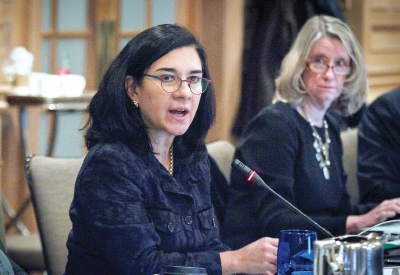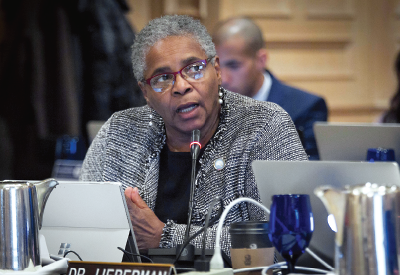Development of APA Registry Ahead of Schedule, Trustees Hear
Abstract
In other actions, the Board approved creation of the Committee on Integrated Care and a new charge for the Reimbursement Committee to prepare for new models of care.
PsychPRO, the mental health registry that APA is developing to help members more easily meet quality reporting and maintenance-of-certification (MOC) requirements, has gotten off to a fast start since the launch of its preliminary phases and is meeting important milestones. That’s what Gregory Dalack, M.D., a member of the Board of Trustees Registry Oversight Work Group, told APA Trustees last month during the Board’s meeting in Arlington, Va.

APA President Maria A. Oquendo, M.D., Ph.D., opens the Board’s March meeting. At right is APA President-elect Anita Everett, M.D.
Registries can provide a convenient way for physicians to follow their patients and improve their experience of care. Registries can also help clinicians meet quality-reporting as well as MOC requirements.
Individual clinicians and health systems have already signed up with PsychPRO (Psychiatric Patient Registry Online) in sufficient numbers for the “Proof of Concept” and “Pilot Cohort” phases to allow the registry to apply for certification by the Centers for Medicare and Medicaid Services (CMS), Dalack said. Qualified Clinical Data Registry (QCDR) certification by CMS means that participating clinicians will be able to avert the 4 percent penalty this year imposed on those who fail to report under the new Merit-Based Incentive Payment System (MIPS). Participating members may also qualify for financial incentive benefits.
Speaking by teleconference to Trustees, Dalack said APA has also secured an agreement with the National Network of Depression Centers (NNDC) to encourage its more than 20 institutional members to join PsychPRO and to partner on national research efforts. NNDC is a coalition of academic medical centers focused on depression and bipolar disorder research.
Dalack said construction of the components that make up the registry is ahead of schedule. “Data dictionaries” that map data elements from electronic health records for 25 MIPS measures have been created, and patient portals are being developed to collect patient-reported outcome measures.

Altha Stewart, M.D., presents the proposal to rename APA’s Human Rights Award in honor of Chester Pierce, M.D.
“The progress of APA’s registry is extremely encouraging,” said APA President Maria A. Oquendo, M.D., Ph.D. “The registry will offer important benefits to participants by allowing them to avoid penalties for not reporting this year under the Merit-Based Incentive Payment System. It will also allow participants to satisfy the Part IV performance-in-practice requirements for Maintenance of Certification. In this way, PsychPRO promises to be an enormous asset to our profession.”
APA CEO and Medical Director Saul Levin, M.D., M.P.A., echoed those comments. “The focus in health care will increasingly be on improving patient outcomes,” he said. “That’s where a registry becomes vital, allowing us to help our members meet the requirements and produce the best outcomes for our patients.”
In related news, Trustees voted to establish the Committee on Integrated Care under the Council on Healthcare Systems and Financing. Appointments to the committee, which replaces the existing Work Group on Integrated Care, will become effective at the end of this year’s Annual Meeting. The work group has, since its creation in 2013, helped to lay the groundwork preparing psychiatrists and APA for the emergence of integrated care.
Now that a payment mechanism has been established for the Collaborative Care Model, additional work will need to occur to ensure the models are implemented appropriately and covered adequately. There is also a large educational effort necessary to identify and train those individuals interested in working in the Collaborative Care Model. The committee is charged with advising and supporting APA on policy development and educational efforts—such as developing resource documents, tool kits, and advocacy materials—to improve access to psychiatric care through improved care coordination and effective integrated care models.
“The Work Group on Integrated Care, under the leadership of Lori Raney, has done a remarkable job in helping to bring us all up to speed about integrated care,” Levin told Psychiatric News. “It is in part due to the success of the work group that we felt it necessary to create a full committee to carry on this important work.”
Additionally, the Board voted to approve a revised charge for the Committee on Reimbursement for Psychiatric Care. The committee is being asked to advise APA policy development and advocacy efforts around public and private sector reimbursement, with a particular focus on new payment models. The committee is also tasked with helping to track emerging issues, trends, and models that impact payment for and access to psychiatric care, as the U.S. health care system transitions to value-based payment methodologies and other payment reforms.

Stella Cai, M.D., comments on the use of social media to campaign for APA office.
Now that a payment mechanism has been established for the Collaborative Care Model, additional work will need to occur to ensure the models are implemented appropriately and covered adequately. There is also a large educational effort necessary to identify and train those individuals interested in working in the Collaborative Care Model. The committee is charged with advising and supporting APA on policy development and educational efforts—such as developing resource documents, tool kits, and advocacy materials—to improve access to psychiatric care through improved care coordination and effective integrated care models.
Other Actions
The Board voted to rename the APA Human Rights Award the Chester M. Pierce Human Rights Award and approved the establishment of a nominating committee to manage the award. The nominating committee will consist of two members from the Council on International Psychiatry, one of whom is a fellow/early career psychiatrist; two members from the Council on Minority Mental Health and Health Disparities, one of whom is a fellow/early career psychiatrist; and a member of the Assembly Committee on Minority and Underrepresented Groups. Serving as a consultant to the committee will be an APA member who is a member of the Black Psychiatrists of America. The president-elect will appoint the committee members and designate one member as the chair.
Trustees voted to approve the Position Statement on Mental Health and Climate Change. The statement reads: “The American Psychiatric Association (APA) recognizes that climate change poses a threat to public health, including mental health. Those with mental health disorders are disproportionately impacted by the consequences of climate change. APA recognizes and commits to support and collaborate with patients, communities, and other health care organizations engaged in efforts to mitigate the adverse health and mental health effects of climate change.” (A similar position statement was approved by the Board of the American Association of Community Psychiatrists.
Trustees voted to approve the charge for an APA Board of Trustees Psychiatric Workforce Work Group. The ad hoc work group will collaborate with an outside consultant on a study to determine the number of psychiatrists needed in the United States.
Trustees agreed that the question of future workforce needs is complex, one contingent on future models of care. According to the Board-approved charge, the study should review existing models for calculating the required number of psychiatrists, clearly documenting all assumptions used in estimating anticipated supply and demand. The consultant should also conduct a series of sensitivity analyses around the current estimate for the entire United States to determine how the number of psychiatrists needed may change in the future. For example, sensitivity analyses could document how correcting a maldistribution of the psychiatric workforce will affect the number of psychiatrists needed in this country; likewise, sensitivity analyses could demonstrate how integrated care and/or telepsychiatry might impact the number of psychiatrists required in the future. ■



